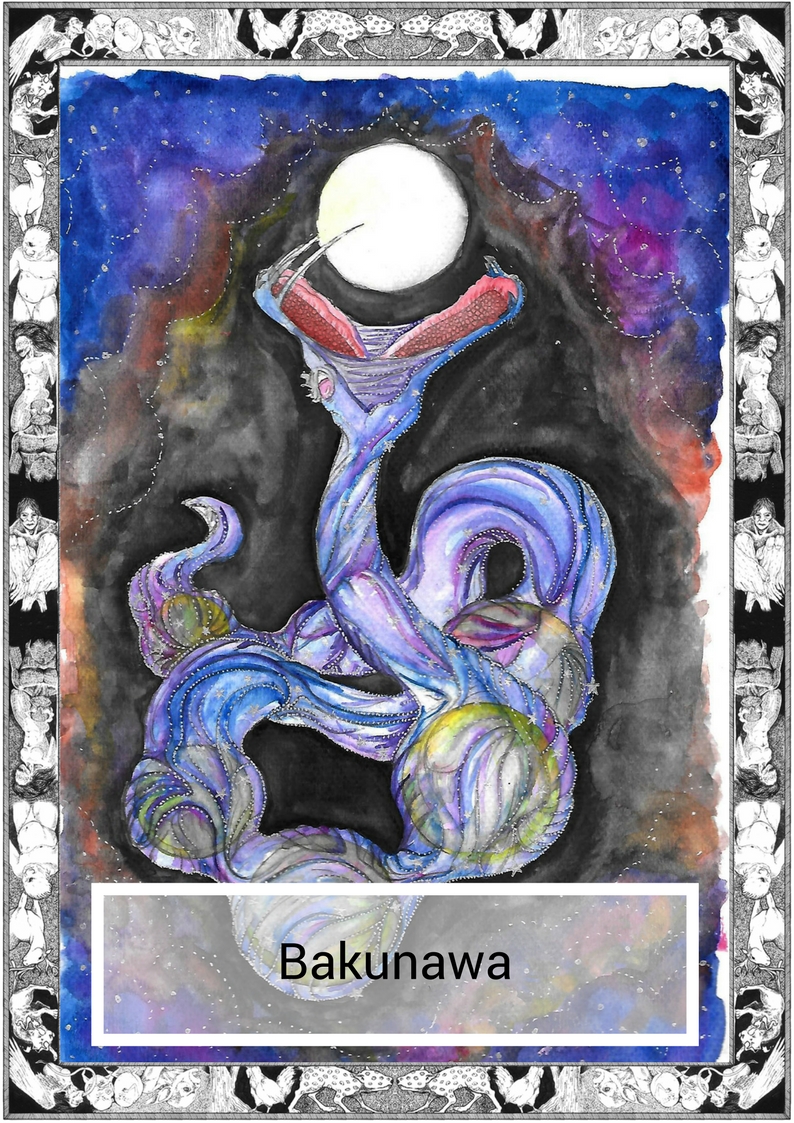
*Note this story is in Bisaya-Iligan
Dihay pito ka Bulan, ug ka-pito sab ka higayon nahigugma ang bakunawa.
Puno sa pagdayeg ug kaibog nga ginalantaw ang kada usa sa mag- igsoong babaye sa ilang paglabay sa kalangitan sa kagabhion. Gusto sa bakunawa nga angkunon ang mga maanyag nga binuhat, ug buot niya nga tukbon sila.
Mao kadto ang unang gabii nga minus ang kahayag sa langit, tungod kay gitukob sa bakunawa ang usa sa mga igsoong babaye ug gitulon kini.
Pila ka bulan ang nilabay ug nalanay ang bulan nga gitukob sa bakunawa.
Walay katagbawan ang bakunawa gawas kun makapanag-iya siya sa bulan, busa iyang gikugihan nga maangkon kini, apan nalanay ra pag-usab ang bulan. Unom ka higayon nga gisulayan sa pag-angkon sa bakunawa ang bulan, apan ka- unom sab kahigayon nalanay ang bulan.
Sa iyang gingharian sa langit, nabantayan ni Bathala nga nawad-an na sa kahayag ang kagabhion. Wala siya mahibalo sa nahitabo kanila apan usa ka gabii niana, napukaw siya gikan sa iyang pagkatulog sa mga siyagit ug dagumbol sa mga tawo..
Mao katong ang higayon nga tukbon na usab sa bakunawa ang ikapitong bulan.
Naninggit ang mga tawo ug nangaliya kang Bathala ug ayuda tungod kay nabalaka sila nga ma-ilog na sa tumang kangitngit ang kagabhion.
Nadungog sa bakunawa ang tingog gikan sa dagumbol ug singgit sa mga tawo, ug abtik kining niatras pabalik sa iyang lungga.
Naminsar pagmaayo ang Ginoo. Unsaon nalang kung lamoyon na sab sa bakunawa ang ika-pitong bulan? Aron malikayan ang maong teribli nga panghitabo, gitamnan niya ug kawayan ang dagway sa bulan. Maanaag ang kahoy isip usa ka ngitngit nga hulagway sa iyang dagway kung mopataas kini sa kalangitan inig kagabii.
Apan dili magpapildi ang bakunawa. Dili maihap ang pagsuway niini nga lamoyon ang ika-pitong bulan apan dili sab maihap ang pagkapakyas niini tungod sa mga pagmaniobra sa mga tawo. Ang mga singgit ug pag-dagumbol sa mga tawo igo nga nagpamatuod para sa magmamando sa kadagatan. Busa mibalik siya sa iyang lungga, ug nagahulat na lang nga makahigayon na usab.
Matud pa sa ubang mga katigulangan, taman sa buhi ug solido pa ang kawayan sa dagway sa bulan, dili gayud magmalamposon ang bakunawa, apan kinahanglan usab magbalantayon kanunay ang mga katawhan.
Taman sa pangitaon sa bakunawa ang iyang premyo, madunggan ang makabungol nga tingog gikan sa tilaok ug mga kamot sa mga katawhan.
————————–
English Version
Seven Moons there were, and seven times the great serpent fell in love.
Each sister was looked at with wonder and admiration as they passed along the night sky. The serpent thought that he must acquire these lovely beings, and sought to swallow them whole.
It was in that first night that the sky would forever be a little less brilliant, for the serpent took one of the sisters in his gaping jaws and swallowed her.
Months passed and the moon which the serpent had swallowed had melted away.
The serpent would not be satisfied unless he possessed a moon, so he tried again, but again, the moon had melted away. Six times the serpent had tried, and six times the moons melted away.
Bathala, in his throne in the skies, had noticed that the nights had lost their light. He did not know what had happened to them, but one night the screams and drums of man roused him from his sleep.
It was at that moment that the serpent was trying to swallow the seventh moon.
Humanity shouted at the great god to intercede, lest the night would forever be stolen by darkness.
The serpent heard the drums and the shouts, and retreated back to his cavern with great haste.
The great god thought hard. What if the serpent tried to swallow up the seventh moon again? To prevent this terrible thing from happening he planted a bamboo tree on the face of the moon. The tree can still be seen as a dark spot on her face when she soars through the night sky.
The serpent would not rest in defeat. Countless times has it tried to swallow up the seventh sister and countless times has it failed due to the machinations of man. The shouts and the drums prove too much for the ruler of the seas, and he retreats back to his caver, waiting on his next chance.
There are those elders that say that as long as the bamboo tree stays solid on the face of the moon the serpent will never succeed, but still mankind watches out for the serpent.
As long as the serpent seeks his prize, the deafening sounds from the throats and hands of man will be heard.
————————–
*Visayan (Bisaya or Binisaya) is a group of languages of the Philippines that are related to Tagalog and Bikol, all three of which are part of the Central Philippine languages. Most Visayan languages are spoken in the whole Visayas section of the country, but they are also spoken in the Bicol Region (particularly in Masbate), islands south of Luzon, such as those that make up Romblon, most of the areas of Mindanao and the province of Sulu located southwest of Mindanao. Some residents of Metro Manila also speak Visayan.
Written by Karl Gaverza
Translation by Shangrela V. Genon-Sieras
Copyright © Karl Gaverza
Translation Copyright © Shangrela V. Genon-Sieras
Adapted from The Moon and the Bacunawa in Philippine Folk Literature: The Myths. Eugenio. 2001.
Watercolor by Tara Singson
IG: https://www.instagram.com/
